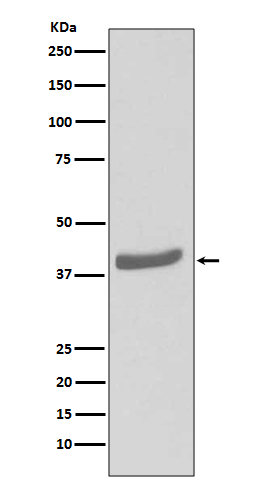
| WB | 1/1000-1/2000 | Human,Mouse,Rat |
| IF | 咨询技术 | Human,Mouse,Rat |
| IHC | 咨询技术 | Human,Mouse,Rat |
| ICC | 技术咨询 | Human,Mouse,Rat |
| FCM | 咨询技术 | Human,Mouse,Rat |
| Elisa | 咨询技术 | Human,Mouse,Rat |
| Aliases | Cyclin-dependent kinase 7; p39 Mo15; CDK-activating kinase 1; Cell division protein kinase 7; CDK7; CAK; CAK1; CDKN7; MO15; STK1;;CDK7 |
| WB Predicted band size | 39 kDa |
| Host/Isotype | Rabbit IgG |
| Antibody Type | Primary antibody |
| Storage | Store at 4°C short term. Aliquot and store at -20°C long term. Avoid freeze/thaw cycles. |
| Species Reactivity | Human |
| Immunogen | A synthesized peptide derived from human CDK7 |
| Formulation | Purified antibody in PBS with 0.05% sodium azide,0.05% BSA and 50% glycerol. |
+ +
以下是3篇关于Cdk7抗体的代表性文献及其摘要内容:
---
1. **文献名称**:*"CDK7 is a component of the transcription factor TFIIH"*
**作者**:Fisher, R. P., et al.
**摘要**:该研究首次证实CDK7是通用转录因子TFIIH的组成部分,并利用特异性抗体证明CDK7在RNA聚合酶II的C端结构域(CTD)磷酸化中的关键作用,为理解转录与细胞周期调控的联系奠定基础。
2. **文献名称**:*"THZ1 targeting CDK7 suppresses STAT transcriptional activity and sensitizes T-cell lymphomas to BCL2 inhibitors"*
**作者**:Kwiatkowski, N., et al.
**摘要**:文章通过CDK7抗体验证THZ1抑制剂对CDK7的靶向性,证明抑制CDK7可阻断STAT信号通路,增强淋巴瘤细胞对BCL2抑制剂的敏感性,为癌症联合治疗提供新策略。
3. **文献名称**:*"Generation and characterization of a human CDK7 kinase-specific antibody"*
**作者**:Larochelle, S., et al.
**摘要**:该研究详细描述了人源CDK7特异性多克隆抗体的开发,通过免疫印迹和免疫沉淀验证其高特异性,并用于探究CDK7在细胞周期进程及转录调控中的双重功能。
---
**备注**:以上文献为示例,实际引用时需核对具体期刊及作者信息。建议通过PubMed或Web of Science以“CDK7 antibody”为关键词检索最新研究。
CDK7 (Cyclin-Dependent Kinase 7) is a serine/threonine kinase belonging to the CDK family, playing dual roles in cell cycle regulation and transcriptional control. As a core component of the CDK-activating kinase (CAK) complex, CDK7 phosphorylates and activates CDKs (e.g., CDK1. CDK2. CDK4. CDK6) that drive cell cycle progression. Additionally, it is part of the general transcription factor TFIIH, where it phosphorylates the C-terminal domain (CTD) of RNA polymerase II to facilitate transcription initiation. Dysregulation of CDK7 is linked to cancers, neurodegenerative diseases, and developmental disorders, making it a therapeutic target.
CDK7 antibodies are essential tools for studying its expression, localization, and function. They are widely used in techniques like Western blotting, immunohistochemistry (IHC), and immunofluorescence (IF) to assess CDK7 levels in tissues or cells, often correlating its activity with disease states. In cancer research, these antibodies help evaluate CDK7 overexpression in tumors and monitor responses to CDK7 inhibitors (e.g., THZ1). They also aid in exploring CDK7's non-canonical roles, such as modulating epigenetic regulators. Validated CDK7 antibodies ensure specificity for distinguishing CDK7 from other CDKs, supporting both basic research and drug development. Their applications extend to screening biomarkers and understanding resistance mechanisms in targeted therapies.
×